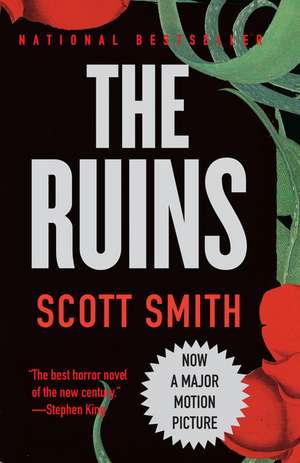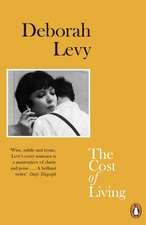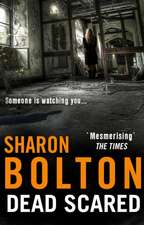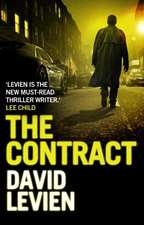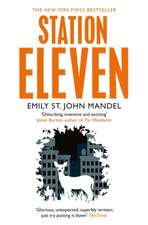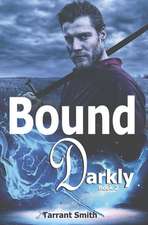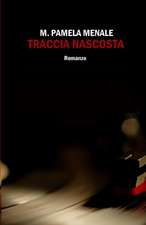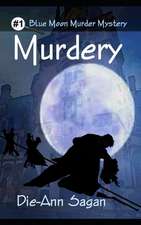The Ruins
Autor Scott Smithen Limba Engleză Paperback – 31 ian 2008
| Toate formatele și edițiile | Preț | Express |
|---|---|---|
| Paperback (2) | 54.09 lei 24-35 zile | +20.63 lei 4-10 zile |
| Transworld Publishers Ltd – aug 2007 | 54.09 lei 24-35 zile | +20.63 lei 4-10 zile |
| Vintage Books USA – 31 ian 2008 | 106.63 lei 3-5 săpt. |
Preț: 106.63 lei
Nou
Puncte Express: 160
Preț estimativ în valută:
20.41€ • 21.08$ • 16.98£
20.41€ • 21.08$ • 16.98£
Carte disponibilă
Livrare economică 04-18 martie
Preluare comenzi: 021 569.72.76
Specificații
ISBN-13: 9780307390271
ISBN-10: 0307390276
Pagini: 369
Dimensiuni: 130 x 204 x 21 mm
Greutate: 0.36 kg
Editura: Vintage Books USA
ISBN-10: 0307390276
Pagini: 369
Dimensiuni: 130 x 204 x 21 mm
Greutate: 0.36 kg
Editura: Vintage Books USA
Notă biografică
Scott Smith was educated at Dartmouth College and Columbia University. He lives in New York City.
Extras
They met Mathias on a day trip to Cozumel. They'd hired a guide to take them snorkeling over a local wreck, but the buoy marking its location had broken off in a storm, and the guide was having difficulty finding it. So they were just swimming about, looking at nothing in particular. Then Mathias rose toward them from the depths, like a merman, a scuba tank on his back. He smiled when they told him their situation, and led them to the wreck. He was German, dark from the sun, and very tall, with a blond crew cut and pale blue eyes. He had a tattoo of an eagle on his right forearm, black with red wings. He let them take turns borrowing his tank so they could drop down thirty feet and see the wreck up close. He was friendly in a quiet way, and his English was only slightly accented, and when they pulled themselves into their guide's boat to head back to shore, he climbed in, too.
They met the Greeks two nights later, back in Cancun, on the beach near their hotel. Stacy got drunk and made out with one of them. Nothing happened beyond that, but the Greeks always seemed to be turning up afterward, no matter where they went or what they were doing. None of them spoke Greek, of course, and the Greeks didn't speak English, so it was mostly smiling and nodding and the occasional sharing of food or drinks. There were three Greeks—in their early twenties, like Mathias and the rest of them—and they seemed friendly enough, even if they did appear to be following them about.
The Greeks not only didn't know English; they couldn't speak Spanish, either. They'd adopted Spanish names, though, which they seemed to find very amusing. Pablo and Juan and Don Quixote was how they introduced themselves, saying the names in their odd accents and gesturing at their chests. Don Quixote was the one Stacy made out with. All three looked enough alike, however—wide-shouldered and slightly padded, with their dark hair grown long and tied back in ponytails—that even Stacy had a hard time keeping track of who was who. It also seemed possible that they were trading the names around, that this was part of the joke, so the one who answered to Pablo on Tuesday would smilingly insist on Wednesday that he was Juan.
They were visiting Mexico for three weeks. It was August, a foolish time to travel to the Yucatán. The weather was too hot, too humid. There were sudden rainstorms nearly every afternoon, downpours that could flood a street in a matter of seconds. And with darkness, the mosquitoes arrived, vast humming clouds of them. In the beginning, Amy complained about all these things, wishing they'd gone to San Francisco, which had been her idea. But then Jeff lost his temper, telling her she was ruining it for everyone else, and she stopped talking about California—the bright, brisk days, the trolley cars, the fog rolling in at dusk. It wasn't really that bad anyway. It was cheap and uncrowded, and she decided to make the best of it.
There were four of them in all: Amy and Stacy and Jeff and Eric. Amy and Stacy were best friends. They'd cut their hair boyishly short for the trip, and they wore matching Panama hats, posing for photos arm in arm. They looked like sisters—Amy the fair one, Stacy the dark—both of them tiny, barely five feet tall, birdlike in their thinness. They were sisterly in their behavior, too, full of whispered secrets, wordless intimacies, knowing looks.
Jeff was Amy's boyfriend; Eric was Stacy's. The boys were friendly with each other, but not exactly friends. It had been Jeff's idea to travel to Mexico, a last fling before he and Amy started medical school in the fall. He'd found a good deal on the Internet: cheap, impossible to pass up. It would be three lazy weeks on the beach, lying in the sun, doing nothing. He'd convinced Amy to come with him, then Amy had convinced Stacy, and Stacy had convinced Eric.
Mathias told them that he'd come to Mexico with his younger brother, Henrich, but Henrich had gone missing. It was a confusing story, and none of them understood all the details. Whenever they asked him about it, Mathias became vague and upset. He slipped into German and waved his hands, and his eyes grew cloudy with the threat of tears. After awhile, they didn't ask anymore; it felt impolite to press. Eric believed that drugs were somehow involved, that Mathias's brother was on the run from the authorities, but whether these authorities were German, American, or Mexican, he couldn't say for certain. There'd been a fight, though; they all agreed upon this. Mathias had argued with his brother, perhaps even struck him, and then Henrich had disappeared. Mathias was worried, of course. He was waiting for him to return so that they could fly back to Germany. Sometimes he seemed confident that Henrich would eventually reappear and that all would be fine in the end, but other times he didn't. Mathias was reserved by nature, a listener rather than a talker, and prone in his present situation to sudden bouts of gloom. The four of them worked hard to cheer him up. Eric told funny stories. Stacy did her imitations. Jeff pointed out interesting sights. And Amy took countless photographs, ordering everyone to smile.
In the day, they sunned on the beach, sweating beside one another on their brightly colored towels. They swam and snorkeled; they got burned and began to peel. They rode horses, paddled around in kayaks, played miniature golf. One afternoon, Eric convinced them all to rent a sailboat, but it turned out he wasn't as adept at sailing as he'd claimed, and they had to be towed back to the dock. It was embarrassing, and expensive. At night, they ate seafood and drank too much beer.
Eric didn't know about Stacy and the Greek. He'd gone to sleep after dinner, leaving the other three to wander the beach with Mathias. There'd been a bonfire burning behind one of the neighboring hotels, a band playing in a gazebo. That was where they met the Greeks. The Greeks were drinking tequila and clapping in rhythm with the music. They offered to share the bottle. Stacy sat next to Don Quixote, and there was much talking, in their mutually exclusive languages, and much laughter, and the bottle passed back and forth, everyone wincing at the burning taste of the liquor, and then Amy turned and found Stacy embracing the Greek. It didn't last very long. Five minutes of kissing, a shy touch of her left breast, and the band was finished for the night. Don Quixote wanted her to go back to his room, but she smiled and shook her head, and it was over as easily as that.
In the morning, the Greeks laid out their towels alongside Mathias and the four of them on the beach, and in the afternoon they all went jet skiing together. You wouldn't have known about the kissing if you hadn't seen it; the Greeks were very gentlemanly, very respectful. Eric seemed to like them, too. He was trying to get them to teach him dirty words in Greek. He was frustrated, though, because it was hard to tell if the words they were teaching him were the ones he wanted to learn.
It turned out that Henrich had left a note. Mathias showed it to Amy and Jeff early one morning, during the second week of their vacation. It was handwritten, in German, with a shakily drawn map at the bottom. They couldn't read the note, of course; Mathias had to translate it for them. There wasn't anything about drugs or the police—that was just Eric being Eric, jumping to conclusions, the more dramatic the better. Henrich had met a girl on the beach. She'd flown in that morning, was on her way to the interior, where she'd been hired to work on an archaeological dig. It was at an old mining camp, maybe a silver mine, maybe emeralds—Mathias wasn't certain. Henrich and the girl had spent the day together. He'd bought her lunch and they'd gone swimming. Then he took her back to his room, where they showered and had sex. Afterward, she left on a bus. In the restaurant, over lunch, she'd drawn a map for him on a napkin, showing him where the dig was. She told him he should come, too, that they'd be glad for his help. Once she left, Henrich couldn't stop talking about her. He didn't eat dinner and he couldn't fall asleep. In the middle of the night, he sat up in bed and announced to Mathias that he was going to join the dig.
Mathias called him a fool. He'd only just met this girl, they were in the midst of their vacation, and he didn't know the first thing about archaeology. Henrich assured him that it was really none of his business. He wasn't asking for Mathias's permission; he was merely informing him of his decision. He climbed out of bed and started to pack. They called each other names, and Henrich threw an electric razor at Mathias, hitting him on the shoulder. Mathias rushed him, knocking him over. They rolled around on the hotel room floor, grappling, grunting obscenities, until Mathias accidentally head-butted Henrich in the mouth, cutting his lip. Henrich made much of this, rushing to the bathroom so that he could spit blood into the sink. Mathias pulled on some clothes and went out to get him ice, but then ended up going downstairs to the all-night bar by the pool. It was three in the morning. Mathias felt he needed to calm down. He drank two beers, one quickly, the other slowly. When he got back to their room, the note was sitting on his pillow. And Henrich was gone.
The note was three-quarters of a page long, though it seemed shorter when Mathias read it out loud in English. It occurred to Amy that Mathias might be skipping some of the passages, preferring to keep them private, but it didn't matter—she and Jeff got the gist of it. Henrich said that Mathias often seemed to mistake being a brother with being a parent. He forgave him for this, yet he still couldn't accept it. Mathias might call him a fool, but he believed it was possible he'd met the love of his life that morning, and he'd never be able to forgive himself—or Mathias, for that matter—if he let this opportunity slip past without pursuing it. He'd try to be back by their departure date, though he couldn't guarantee this. He hoped Mathias would manage to have fun on his own while he was gone. If Mathias grew lonely, he could always come and join them at the dig; it was only a half day's drive to the west. The map at the bottom of the note—a hand-drawn copy of the one the girl had sketched on the napkin for Henrich—showed him how to get there.
As Amy listened to Mathias tell his story and then struggle to translate his brother's note, she gradually began to realize that he was asking for their advice. They were sitting on the veranda of their hotel. A breakfast buffet was offered here every morning: eggs and pancakes and French toast, juice and coffee and tea, an immense pile of fresh fruit. A short flight of stairs led to the beach. Seagulls hovered overhead, begging for scraps of food, shitting on the umbrellas above the tables. Amy could hear the steady sighing of the surf, could see the occasional jogger shuffling past, an elderly couple searching for shells, a trio of hotel employees raking the sand. It was very early, just after seven. Mathias had awakened them, calling from the house phone downstairs. Stacy and Eric were still asleep.
Jeff leaned forward to study the map. It was clear to Amy, without anything explicit having been said, that it was his advice Mathias was soliciting. Amy didn't take offense; she was used to this sort of thing. Jeff had something about him that made people trust him, an air of competence and self-confidence. Amy sat back in her seat and watched him smooth the wrinkles from the map with the palm of his hand. Jeff had curly, dark hair, and eyes that changed color with the light. They could be hazel or green or the palest of brown. He wasn't as tall as Mathias, or as broad in the shoulders, but despite this, he somehow seemed to be the larger of the two. He had a gravity to him: he was calm, always calm. Someday, if all went according to plan, Amy imagined that this would be what would make him a good doctor. Or, at the very least, what would make people think of him as a good doctor.
Mathias's leg was jiggling, his knee jumping up and down. It was Wednesday morning. He and his brother were scheduled to fly home on Friday afternoon. "I go," he said. "I get him. I take him home. Right?"
Jeff glanced up from the map. "You'd be back this evening?" he asked.
Mathias shrugged, waved at the note. He only knew what his brother had written.
Amy recognized some of the towns on the map—Tizimín, Valladolid, Cobá—names she'd seen in their guidebook. She hadn't really read the book; she'd only looked at the pictures. She remembered a ruined hacienda on the Tizimín page, a street lined with whitewashed buildings for Valladolid, a gigantic stone face buried in vines for Cobá. Mathias's map had an X drawn somewhere vaguely west of Cobá. This was where the dig was. You rode a bus from Cancún to Cobá, where you hired a taxi, which took you eleven miles farther west. Then there was a path leading away from the road, two miles long, that you had to hike. If you came to the Mayan village, you'd gone too far.
Watching Jeff examine the map, she could guess what he was thinking. It had nothing to do with Mathias or his brother. He was thinking of the jungle, of the ruins there, and what it might be like to explore them. They'd talked vaguely of doing this when they'd first arrived: how they could hire a car, a local guide, and see whatever there was to be seen. But it was so hot; the idea of trudging through the jungle to take pictures of giant flowers or lizards or crumbling stone walls seemed less and less attractive the more they discussed it. So they stayed on the beach. But now? The morning was deceptively cool, with a breeze coming in off the water; she knew that it must be hard for Jeff to remember how humid the day would ultimately become. Yes, it was easy enough for her to guess what he was thinking: why shouldn't it be fun? They were slipping into a torpor, with all the sun and the food and the drinking. A little adventure like this might be just the thing to wake them up.
From the Hardcover edition.
They met the Greeks two nights later, back in Cancun, on the beach near their hotel. Stacy got drunk and made out with one of them. Nothing happened beyond that, but the Greeks always seemed to be turning up afterward, no matter where they went or what they were doing. None of them spoke Greek, of course, and the Greeks didn't speak English, so it was mostly smiling and nodding and the occasional sharing of food or drinks. There were three Greeks—in their early twenties, like Mathias and the rest of them—and they seemed friendly enough, even if they did appear to be following them about.
The Greeks not only didn't know English; they couldn't speak Spanish, either. They'd adopted Spanish names, though, which they seemed to find very amusing. Pablo and Juan and Don Quixote was how they introduced themselves, saying the names in their odd accents and gesturing at their chests. Don Quixote was the one Stacy made out with. All three looked enough alike, however—wide-shouldered and slightly padded, with their dark hair grown long and tied back in ponytails—that even Stacy had a hard time keeping track of who was who. It also seemed possible that they were trading the names around, that this was part of the joke, so the one who answered to Pablo on Tuesday would smilingly insist on Wednesday that he was Juan.
They were visiting Mexico for three weeks. It was August, a foolish time to travel to the Yucatán. The weather was too hot, too humid. There were sudden rainstorms nearly every afternoon, downpours that could flood a street in a matter of seconds. And with darkness, the mosquitoes arrived, vast humming clouds of them. In the beginning, Amy complained about all these things, wishing they'd gone to San Francisco, which had been her idea. But then Jeff lost his temper, telling her she was ruining it for everyone else, and she stopped talking about California—the bright, brisk days, the trolley cars, the fog rolling in at dusk. It wasn't really that bad anyway. It was cheap and uncrowded, and she decided to make the best of it.
There were four of them in all: Amy and Stacy and Jeff and Eric. Amy and Stacy were best friends. They'd cut their hair boyishly short for the trip, and they wore matching Panama hats, posing for photos arm in arm. They looked like sisters—Amy the fair one, Stacy the dark—both of them tiny, barely five feet tall, birdlike in their thinness. They were sisterly in their behavior, too, full of whispered secrets, wordless intimacies, knowing looks.
Jeff was Amy's boyfriend; Eric was Stacy's. The boys were friendly with each other, but not exactly friends. It had been Jeff's idea to travel to Mexico, a last fling before he and Amy started medical school in the fall. He'd found a good deal on the Internet: cheap, impossible to pass up. It would be three lazy weeks on the beach, lying in the sun, doing nothing. He'd convinced Amy to come with him, then Amy had convinced Stacy, and Stacy had convinced Eric.
Mathias told them that he'd come to Mexico with his younger brother, Henrich, but Henrich had gone missing. It was a confusing story, and none of them understood all the details. Whenever they asked him about it, Mathias became vague and upset. He slipped into German and waved his hands, and his eyes grew cloudy with the threat of tears. After awhile, they didn't ask anymore; it felt impolite to press. Eric believed that drugs were somehow involved, that Mathias's brother was on the run from the authorities, but whether these authorities were German, American, or Mexican, he couldn't say for certain. There'd been a fight, though; they all agreed upon this. Mathias had argued with his brother, perhaps even struck him, and then Henrich had disappeared. Mathias was worried, of course. He was waiting for him to return so that they could fly back to Germany. Sometimes he seemed confident that Henrich would eventually reappear and that all would be fine in the end, but other times he didn't. Mathias was reserved by nature, a listener rather than a talker, and prone in his present situation to sudden bouts of gloom. The four of them worked hard to cheer him up. Eric told funny stories. Stacy did her imitations. Jeff pointed out interesting sights. And Amy took countless photographs, ordering everyone to smile.
In the day, they sunned on the beach, sweating beside one another on their brightly colored towels. They swam and snorkeled; they got burned and began to peel. They rode horses, paddled around in kayaks, played miniature golf. One afternoon, Eric convinced them all to rent a sailboat, but it turned out he wasn't as adept at sailing as he'd claimed, and they had to be towed back to the dock. It was embarrassing, and expensive. At night, they ate seafood and drank too much beer.
Eric didn't know about Stacy and the Greek. He'd gone to sleep after dinner, leaving the other three to wander the beach with Mathias. There'd been a bonfire burning behind one of the neighboring hotels, a band playing in a gazebo. That was where they met the Greeks. The Greeks were drinking tequila and clapping in rhythm with the music. They offered to share the bottle. Stacy sat next to Don Quixote, and there was much talking, in their mutually exclusive languages, and much laughter, and the bottle passed back and forth, everyone wincing at the burning taste of the liquor, and then Amy turned and found Stacy embracing the Greek. It didn't last very long. Five minutes of kissing, a shy touch of her left breast, and the band was finished for the night. Don Quixote wanted her to go back to his room, but she smiled and shook her head, and it was over as easily as that.
In the morning, the Greeks laid out their towels alongside Mathias and the four of them on the beach, and in the afternoon they all went jet skiing together. You wouldn't have known about the kissing if you hadn't seen it; the Greeks were very gentlemanly, very respectful. Eric seemed to like them, too. He was trying to get them to teach him dirty words in Greek. He was frustrated, though, because it was hard to tell if the words they were teaching him were the ones he wanted to learn.
It turned out that Henrich had left a note. Mathias showed it to Amy and Jeff early one morning, during the second week of their vacation. It was handwritten, in German, with a shakily drawn map at the bottom. They couldn't read the note, of course; Mathias had to translate it for them. There wasn't anything about drugs or the police—that was just Eric being Eric, jumping to conclusions, the more dramatic the better. Henrich had met a girl on the beach. She'd flown in that morning, was on her way to the interior, where she'd been hired to work on an archaeological dig. It was at an old mining camp, maybe a silver mine, maybe emeralds—Mathias wasn't certain. Henrich and the girl had spent the day together. He'd bought her lunch and they'd gone swimming. Then he took her back to his room, where they showered and had sex. Afterward, she left on a bus. In the restaurant, over lunch, she'd drawn a map for him on a napkin, showing him where the dig was. She told him he should come, too, that they'd be glad for his help. Once she left, Henrich couldn't stop talking about her. He didn't eat dinner and he couldn't fall asleep. In the middle of the night, he sat up in bed and announced to Mathias that he was going to join the dig.
Mathias called him a fool. He'd only just met this girl, they were in the midst of their vacation, and he didn't know the first thing about archaeology. Henrich assured him that it was really none of his business. He wasn't asking for Mathias's permission; he was merely informing him of his decision. He climbed out of bed and started to pack. They called each other names, and Henrich threw an electric razor at Mathias, hitting him on the shoulder. Mathias rushed him, knocking him over. They rolled around on the hotel room floor, grappling, grunting obscenities, until Mathias accidentally head-butted Henrich in the mouth, cutting his lip. Henrich made much of this, rushing to the bathroom so that he could spit blood into the sink. Mathias pulled on some clothes and went out to get him ice, but then ended up going downstairs to the all-night bar by the pool. It was three in the morning. Mathias felt he needed to calm down. He drank two beers, one quickly, the other slowly. When he got back to their room, the note was sitting on his pillow. And Henrich was gone.
The note was three-quarters of a page long, though it seemed shorter when Mathias read it out loud in English. It occurred to Amy that Mathias might be skipping some of the passages, preferring to keep them private, but it didn't matter—she and Jeff got the gist of it. Henrich said that Mathias often seemed to mistake being a brother with being a parent. He forgave him for this, yet he still couldn't accept it. Mathias might call him a fool, but he believed it was possible he'd met the love of his life that morning, and he'd never be able to forgive himself—or Mathias, for that matter—if he let this opportunity slip past without pursuing it. He'd try to be back by their departure date, though he couldn't guarantee this. He hoped Mathias would manage to have fun on his own while he was gone. If Mathias grew lonely, he could always come and join them at the dig; it was only a half day's drive to the west. The map at the bottom of the note—a hand-drawn copy of the one the girl had sketched on the napkin for Henrich—showed him how to get there.
As Amy listened to Mathias tell his story and then struggle to translate his brother's note, she gradually began to realize that he was asking for their advice. They were sitting on the veranda of their hotel. A breakfast buffet was offered here every morning: eggs and pancakes and French toast, juice and coffee and tea, an immense pile of fresh fruit. A short flight of stairs led to the beach. Seagulls hovered overhead, begging for scraps of food, shitting on the umbrellas above the tables. Amy could hear the steady sighing of the surf, could see the occasional jogger shuffling past, an elderly couple searching for shells, a trio of hotel employees raking the sand. It was very early, just after seven. Mathias had awakened them, calling from the house phone downstairs. Stacy and Eric were still asleep.
Jeff leaned forward to study the map. It was clear to Amy, without anything explicit having been said, that it was his advice Mathias was soliciting. Amy didn't take offense; she was used to this sort of thing. Jeff had something about him that made people trust him, an air of competence and self-confidence. Amy sat back in her seat and watched him smooth the wrinkles from the map with the palm of his hand. Jeff had curly, dark hair, and eyes that changed color with the light. They could be hazel or green or the palest of brown. He wasn't as tall as Mathias, or as broad in the shoulders, but despite this, he somehow seemed to be the larger of the two. He had a gravity to him: he was calm, always calm. Someday, if all went according to plan, Amy imagined that this would be what would make him a good doctor. Or, at the very least, what would make people think of him as a good doctor.
Mathias's leg was jiggling, his knee jumping up and down. It was Wednesday morning. He and his brother were scheduled to fly home on Friday afternoon. "I go," he said. "I get him. I take him home. Right?"
Jeff glanced up from the map. "You'd be back this evening?" he asked.
Mathias shrugged, waved at the note. He only knew what his brother had written.
Amy recognized some of the towns on the map—Tizimín, Valladolid, Cobá—names she'd seen in their guidebook. She hadn't really read the book; she'd only looked at the pictures. She remembered a ruined hacienda on the Tizimín page, a street lined with whitewashed buildings for Valladolid, a gigantic stone face buried in vines for Cobá. Mathias's map had an X drawn somewhere vaguely west of Cobá. This was where the dig was. You rode a bus from Cancún to Cobá, where you hired a taxi, which took you eleven miles farther west. Then there was a path leading away from the road, two miles long, that you had to hike. If you came to the Mayan village, you'd gone too far.
Watching Jeff examine the map, she could guess what he was thinking. It had nothing to do with Mathias or his brother. He was thinking of the jungle, of the ruins there, and what it might be like to explore them. They'd talked vaguely of doing this when they'd first arrived: how they could hire a car, a local guide, and see whatever there was to be seen. But it was so hot; the idea of trudging through the jungle to take pictures of giant flowers or lizards or crumbling stone walls seemed less and less attractive the more they discussed it. So they stayed on the beach. But now? The morning was deceptively cool, with a breeze coming in off the water; she knew that it must be hard for Jeff to remember how humid the day would ultimately become. Yes, it was easy enough for her to guess what he was thinking: why shouldn't it be fun? They were slipping into a torpor, with all the sun and the food and the drinking. A little adventure like this might be just the thing to wake them up.
From the Hardcover edition.
Recenzii
"The best horror novel of the new century."
—Stephen King
"The Ruins does for Mexican vacations what Jaws did for New England beaches.”
—Entertainment Weekly
“The most disturbing novel of the year.” —Time
“Smith’s nail-biting tension is a pleasure all its own. . . . This stuff isn’t for the faint of heart.” —New York Post
“A story so scary you may never want to go on vacation, or dig around in your garden, again.” —USA Today
“A smart, clean-burning horror machine.”
—New York Times Book Review
“A classic horror story, told with mounting, detail. Smith spins it out relentlessly, piling chill on chill on chill. . . . What happens, and needless to say it’s not good, is something readers will race page after flapping page to discover. When they do, they will findߝwell, better set aside eight or nine hours reading time, keep the lights on, and make sure the plants are still in their pots.”
—Bill Bell, The Daily News
“A fast-paced suspense novel that grabs you and refuses to let go. . . Smith’s characterization and timingߝthe ability to deliver one quick blow after antoherߝmakes the book so freakishly fun. . . . The story turns grotesque, but Smith’s command of his characters and their demons is masterful. . . . The Ruins is chilling, an icy dissection of human nature in a hot, horrifying place.”
—John Caniglia, The Cleveland Plain Dealer
“An exercise in unremitting tension . . . Smith writes in clear, vivid language with elegant sentences.”
—Diane Scharper, The Baltimore Sun
“One of the most terrifying, creepy, riveting novels that will hit the bookstores this summer. . . . Smith sculpts each of the characters, making us care very much about what happens to these young, naive and sometimes selfish individuals. . . . The Ruins has a claustrophobic feel, which adds to the palpatations of suspense. The great outdoors might as well be a dark, dingy basement full of things that go bump in the night as Smith finds new ways to frighten with his setting.”
—Oline H. Cogdill, The Sun-Sentinel
“Reading Scott Smith is like having a rope tied firmly round your middle, as you’re pulled on protesting tiptoes toward a door marked DOOM. . . . Smith is a master of the ‘if only’ scenario, that most foolish and pungent form of regret . . . At its heart, The Ruins is an old-fashioned horror story, and it’s the invasive, intuitive killer that provides the ice-water dread. . . . It’s Thomas Harris meets Poe in a decidedly timely story: Smith has tapped into our anxieties about global warming, lethal weather, supergermsߝour collective fear that nature is finally battling backߝand given us a decidedly organic nightmare. Grade: A-.
—Gillian Flynn, Entertainment Weekly
“Once again, Smith (A Simple Plan) deftly explores psychological tension and insidious fears. A perfect beach read; just don’t stray too far from the lifeguard.”
—Library Journal
“A word of caution to readers, gentle and otherwise: Do not pick up a copy of Scott Smith’s The Ruins if you have anything else you need to do in the next eight hours or so. Don’t start this book if you’re especially weak of stomach or nerves, and above all don’t pick it up if you’re not willing to tolerate some deviation from the usual conventions of thrillers and horror stories. . . . The Ruins is like all great genre fiction in its irresistible storytelling momentum, but in its lack of mercy, it’s more like real life. . . . The Ruins is ruthlessly frank about how most of us really behave in extremis. The escalating nightmare of the group’s fate evolves inexorably from their personalities, in a way reminiscent of Greek tragedy, so Smith couldn’t get away with the flimsy figurines that populate more genre fiction. In The Ruins, all of the characters and their vexed interrrelationships are richly and carefully drawn because, in a way, they are the story. . . . Scott Smith shows us an aspect of ourselves and of human nature we’d rather not acknowledge. He’s such a master, though, that it’s impossible to look away.
—Laura Miller, Salon
—Stephen King
"The Ruins does for Mexican vacations what Jaws did for New England beaches.”
—Entertainment Weekly
“The most disturbing novel of the year.” —Time
“Smith’s nail-biting tension is a pleasure all its own. . . . This stuff isn’t for the faint of heart.” —New York Post
“A story so scary you may never want to go on vacation, or dig around in your garden, again.” —USA Today
“A smart, clean-burning horror machine.”
—New York Times Book Review
“A classic horror story, told with mounting, detail. Smith spins it out relentlessly, piling chill on chill on chill. . . . What happens, and needless to say it’s not good, is something readers will race page after flapping page to discover. When they do, they will findߝwell, better set aside eight or nine hours reading time, keep the lights on, and make sure the plants are still in their pots.”
—Bill Bell, The Daily News
“A fast-paced suspense novel that grabs you and refuses to let go. . . Smith’s characterization and timingߝthe ability to deliver one quick blow after antoherߝmakes the book so freakishly fun. . . . The story turns grotesque, but Smith’s command of his characters and their demons is masterful. . . . The Ruins is chilling, an icy dissection of human nature in a hot, horrifying place.”
—John Caniglia, The Cleveland Plain Dealer
“An exercise in unremitting tension . . . Smith writes in clear, vivid language with elegant sentences.”
—Diane Scharper, The Baltimore Sun
“One of the most terrifying, creepy, riveting novels that will hit the bookstores this summer. . . . Smith sculpts each of the characters, making us care very much about what happens to these young, naive and sometimes selfish individuals. . . . The Ruins has a claustrophobic feel, which adds to the palpatations of suspense. The great outdoors might as well be a dark, dingy basement full of things that go bump in the night as Smith finds new ways to frighten with his setting.”
—Oline H. Cogdill, The Sun-Sentinel
“Reading Scott Smith is like having a rope tied firmly round your middle, as you’re pulled on protesting tiptoes toward a door marked DOOM. . . . Smith is a master of the ‘if only’ scenario, that most foolish and pungent form of regret . . . At its heart, The Ruins is an old-fashioned horror story, and it’s the invasive, intuitive killer that provides the ice-water dread. . . . It’s Thomas Harris meets Poe in a decidedly timely story: Smith has tapped into our anxieties about global warming, lethal weather, supergermsߝour collective fear that nature is finally battling backߝand given us a decidedly organic nightmare. Grade: A-.
—Gillian Flynn, Entertainment Weekly
“Once again, Smith (A Simple Plan) deftly explores psychological tension and insidious fears. A perfect beach read; just don’t stray too far from the lifeguard.”
—Library Journal
“A word of caution to readers, gentle and otherwise: Do not pick up a copy of Scott Smith’s The Ruins if you have anything else you need to do in the next eight hours or so. Don’t start this book if you’re especially weak of stomach or nerves, and above all don’t pick it up if you’re not willing to tolerate some deviation from the usual conventions of thrillers and horror stories. . . . The Ruins is like all great genre fiction in its irresistible storytelling momentum, but in its lack of mercy, it’s more like real life. . . . The Ruins is ruthlessly frank about how most of us really behave in extremis. The escalating nightmare of the group’s fate evolves inexorably from their personalities, in a way reminiscent of Greek tragedy, so Smith couldn’t get away with the flimsy figurines that populate more genre fiction. In The Ruins, all of the characters and their vexed interrrelationships are richly and carefully drawn because, in a way, they are the story. . . . Scott Smith shows us an aspect of ourselves and of human nature we’d rather not acknowledge. He’s such a master, though, that it’s impossible to look away.
—Laura Miller, Salon
Descriere
Trapped in the Mexican jungle, a group of friends stumble upon a creeping horror unlike anything they've ever known, in this national bestseller that is soon to be a major motion picture.
